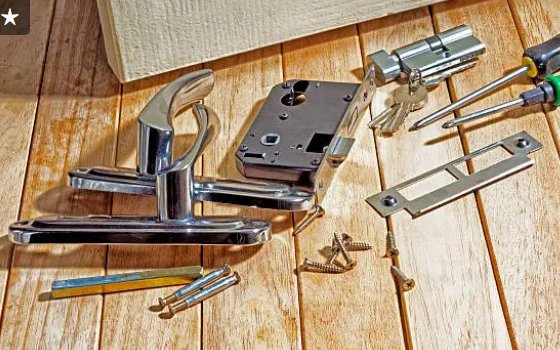
The lifespan of interior door hardware isn’t just a matter of aesthetics. It impacts convenience, safety, and even resale value. Just as you’d research the best materials for flooring or countertops, doing the same for door hardware is essential. In this guide, let’s explore the different materials used in door hardware, from solid brass to stainless steel, and how each one stacks up in terms of longevity and performance.
The Basics of Door Hardware Materials
To understand the lifespan of indoor door hardware, it’s important to know what materials are commonly used. Each material offers distinct qualities that affect durability, maintenance, and appearance.
- Brass: Popular for its classic look and robust nature.
- Stainless Steel: Known for its resistance to rust and corrosion.
- Aluminum: Lightweight and budget-friendly but may not be as durable.
- Zinc Alloy: A cost-effective alternative with decent strength.
Each material has its pros and cons, which can be likened to deciding between different types of fitness gear. Just as running shoes might last longer than sandals for running, some hardware materials outlast others depending on how they’re used and maintained.
Brass Door Hardware: Timeless and Durable
Brass has been a go-to choice for door hardware for decades, and for good reason. Its natural beauty and warmth suit both traditional and modern decor. Brass hardware can last anywhere from 50 to 100 years with proper care. However, this longevity depends on a few factors like the quality of the brass and how exposed it is to moisture.
Brass does tarnish, which means regular cleaning is essential to maintain its shine. Fortunately, a mixture of vinegar and baking soda can do wonders for tarnished brass. Just imagine polishing a family heirloom—you want it to shine and be admired.
One common issue with brass is its susceptibility to scratches. So if you have pets or rambunctious kids, you might find yourself cleaning or replacing hardware more often than if you chose a tougher material.
Stainless Steel: The Modern Contender
If you’re looking for something contemporary, stainless steel is hard to beat. This material is incredibly strong and resistant to rust and corrosion, making it ideal for areas with high humidity, like bathrooms. Typically, stainless steel door hardware can last anywhere from 30 to 50 years.
You’ll often find stainless steel in commercial buildings due to its durability, but it can also work beautifully in residential spaces. The sleek finish matches well with modern aesthetics, offering a clean look that enhances any door.
However, it’s not all sunshine and rainbows. Stainless steel can become scratched or dented if not treated carefully. Regular cleaning with a soft cloth can help maintain its polished appearance, ensuring it looks as good on year 10 as it did on day one.
Aluminum: The Lightweight Option
Aluminum hardware offers great value and is typically the least expensive option on the market. This lightweight material is resistant to corrosion, making it a good choice for those on a budget or for temporary installations. However, don’t expect it to last as long as brass or stainless steel. You’re looking at a lifespan of about 10 to 20 years.
While aluminum has its merits, it’s important to note that it can bend or warp over time, especially if the door experiences heavy use. Think of it like a light jacket—great for a casual outing but not suitable for a winter storm.
If you choose aluminum, consider investing in higher-quality hardware that promises better durability. After all, a few extra dollars could save you from frequent replacements.
Zinc Alloy: Affordable Yet Functional
Zinc alloy is another cost-effective option that finds its way into many homes. While it might not have the same prestige as brass or stainless steel, it can still get the job done. It typically lasts around 10 to 15 years, making it a decent choice for less frequently used doors or temporary setups.
One of the advantages of zinc alloy is its variety of finishes and styles, allowing homeowners to match it to their decor without breaking the bank. However, it’s important to be mindful of its vulnerability to rust and corrosion, particularly in damp environments.
If you opt for zinc alloy, keep an eye on its condition. Regular maintenance can prolong its life, and knowing when to replace it can help keep your doors functional and stylish.
Factors Affecting Lifespan
While the material itself significantly impacts the lifespan of door hardware, several other factors play a role as well. Here’s what you should keep in mind:
1. Installation Quality: Even the best materials can fail if installed incorrectly. Ensuring proper alignment and secure fittings is crucial.
2. Environmental Conditions: Humidity, temperature fluctuations, and exposure to harsh weather can all influence how long your hardware lasts. Areas prone to moisture will likely wear down materials faster.
3. Usage Frequency: High-traffic doors will experience more wear and tear. Consider a sturdier material for main entrances or family rooms, while lighter materials can work for closets.
4. Maintenance Routine: Regular cleaning and inspection can considerably extend the lifespan of your hardware. It’s like getting regular check-ups for your car; a little attention can go a long way.
Choosing the right interior door hardware material isn’t just about aesthetics—it’s also about how long you want it to last and how much maintenance you’re willing to commit to. Whether you go for the classic durability of brass, the modern resilience of stainless steel, or the budget-friendly options of aluminum and zinc alloy, understanding their lifespans can help you make an informed decision.
So before you install those new door knobs or hinges, take a moment to consider your lifestyle and needs. After all, the right choice today can save you time and money tomorrow, keeping your home looking sharp and functioning smoothly for years to come.